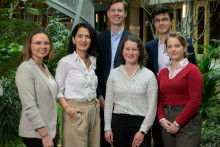Yale University, the University of Leipzig, and Columbia University; just a few of the prestigious opponents that Negotiation Project Twente awaits. Yet it is precisely those universities that are watching the UT team's achievements with trembling knees. 'The organisation of this student tournament calls us 'The University of great negotiation', says Kevin Tuinte (23), one of the three team members.
The challenge has existed since 2007 and the Enschedeers have always finished in the top 5 since then. The icing on the cake followed last year. Then the UT team crowned itself the winner. 'That World Cup was extra special because it took place in Enschede. We can say that there is pressure to maintain our good reputation.'
Tuinte and his two Romanian teammates – David Galati (23) and Octaviana Cheteles (22) – pay for the trip entirely out of their own pockets. The cost? Two thousand euros per person. 'We don't have a sponsor. So maybe next time we should negotiate well with a sponsor', says Galati.
Practice sessions via Teams
The three are training hard to perform well in Cape Town. In this way, they practice with other universities. 'For example, we schedule practice sessions via Teams with students from German and Greek universities. The topics of those negotiations go in all directions,' says Tuinte. 'From concluding contracts that are as favourable as possible to good deals where you are the buying or selling party. But it could also be political issues,' adds teammate Galati. 'The negotiation of such a case can sometimes take three hours.'
Right strategy
A total of sixteen teams from all parts of the world will travel to South Africa. These cultural differences require Negotiation Project Twente to adopt the right approach and negotiation strategy. 'People from Poland are usually direct and are right on the content. But Indians first want to bond and build trust during a conversation,' says Tuinte. The team's strategy is clear. 'We adapt to the culture of the opponent.'
But when do you come out as the winner? 'The most important thing is the negotiation style and getting a good deal. But you also get points for the way of communicating to the other party. For example, is your team building a good relationship and what does the other party think about you? In addition, a jury also hands out points for body language and posture. That way you are judged on no less than ten points,' says Tuinte. The world championship has no elimination race, the jury determines one winner after three to four rounds. It will be a tough, stressful and energy-consuming challenge. Nevertheless, the team will soon leave for the land of the big five with one goal: 'To win!'
Warsaw awaits
Whatever the outcome of the world championships, the three teammates will not have much time to rest. The next challenge after the World Championships is already on the agenda of Negotiation Project Twente: Warsaw Negotiation Round. The sixteenth edition of this tournament will take place from May 9 to May 11.







